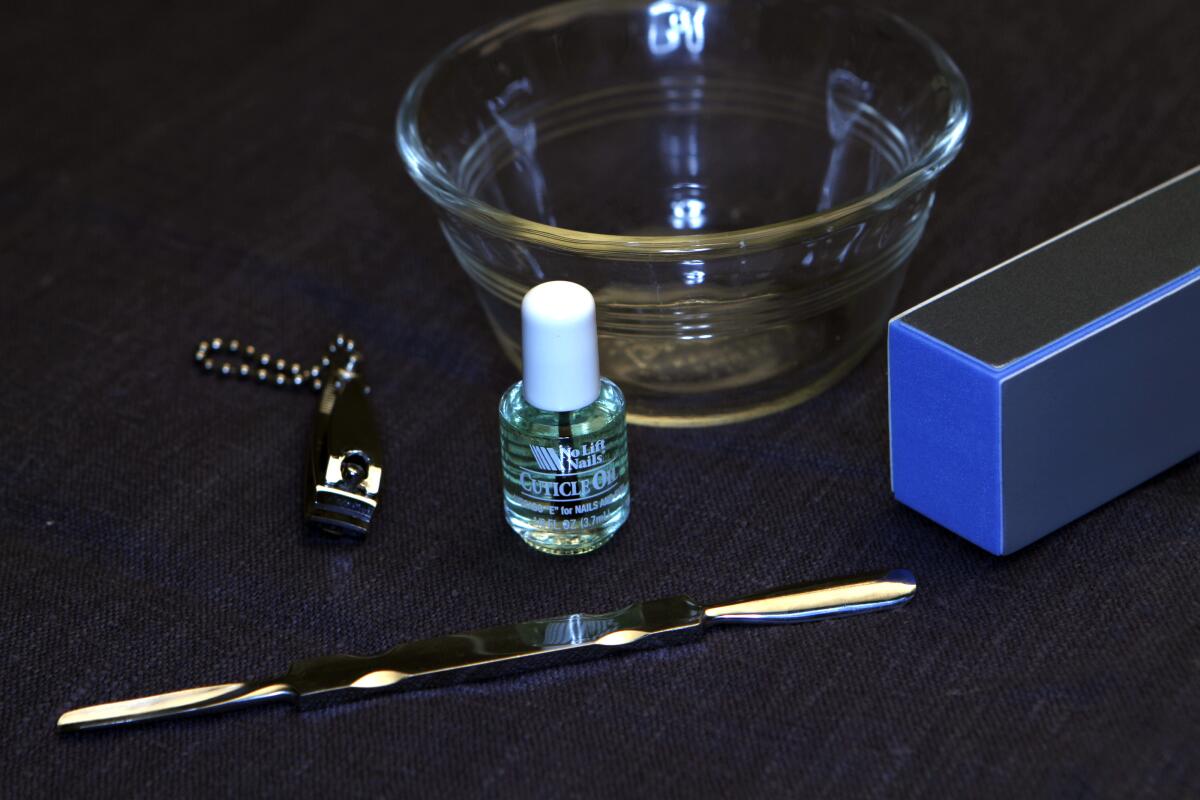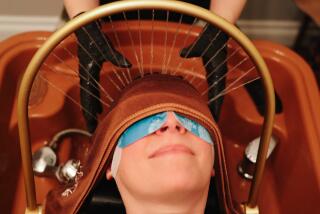It is the exact right time to invest in a Flowbee, and more grooming tips

Barbershops and nail salons across the Southland may be closed (through at least mid-April), but the hair on your head and the nails on your digits are going to keep growing regardless.
Therefore, unless you gentlemen plan to come out the other end of this safer-at-home period looking like Saddam Hussein emerging from his spider hole in 2003, you’re going to have to pick up the slack and do some of these previously outsourced grooming tasks yourself.
DIY haircuts that don’t suck (and one that does)
For those who spent their formative years watching late-night TV infomercials circa 1990, nothing epitomized the technological wizardry and unlimited potential of the at-home haircut like the Flowbee, a gizmo that attached to the hose of a home vacuum cleaner and clipped hair by sucking it toward the clipper’s recessed blades. (Added bonus? Less mess!)
Invented by San Diego carpenter Rick Hunts, it sold in the millions and spawned many a pop culture meme (perhaps most memorably in the Suck Kut scene from “Wayne’s World”). If you’re hoping to add a dash of nostalgia to your DIY haircut adventure, you’re in luck because the Flowbee still exists and can be ordered online from the fantastically retro-looking flowbee.com website for $98.95 plus shipping and handling. (But wait! There’s more! For an additional $41, they’ll throw in a mini vacuum cleaner.)
And if you order one, you apparently won’t be the only one thinking about the quirky comforts of home haircuts past; according to Flowbee’s customer service department, the made-in-Texas contraption is currently “flying off the shelves.”
While a Flowbee instructional DVD will cost another $9.50, if your preference is to embark on an adventure in home haircuts unaided by the family vacuum cleaner, YouTube is full of free tutorials for the neophyte self-coiffer.
Start by searching for DIY plus the type of haircut you’re aiming for (taper fade, for example, or Mohawk or the 1920s-style undercut from “Boardwalk Empire”). Next, narrow the field by watching a few different options to make sure you’ve found a presentation style and pacing that fits your skill level. Only after you’re confident you understand all the steps in the cut should you pick up your weapon of choice. (More on that below.)

The YouTube channel Tips for Clips does a great job of explaining each step as well as demystifying some of the often-confusing barbershop lingo (even if you ultimately take your DIY advice elsewhere, watching the primer on barbering terms will be four minutes and 42 seconds well spent) and the recent tutorial “Grooming HACKS to Avoid Cutting Your Own Hair” offers a middle path for those not quite ready to take the tonsorial plunge.
You get what you pay for, of course, and many of the biggest names in men’s grooming have compiled their own tutorials (video and otherwise) in hopes of convincing you to buy their brand. Wahl, which has more than a century of experience in the clipper category (namesake founder Leo J. Wahl patented his electromagnetic hair clipper way back in 1919), will school you with its Haircuts 101 video tutorials, and Remington’s “Get Inspired” blog offers a deep bench of tips and tricks — for women as well as men with different types of hair — arranged by category.
Remington’s also got a good gadget for the guy who prefers the all-around close-cropped cut (or the balding man trying to avoid looking like Dilbert’s Pointy-Haired Boss): the ShortCut ($59.99), a tiny clipper with a curved blade that conforms to the shape of the head. (On a side note, this reporter gave the original version a test drive when it first hit the market in 2008 and, more than a dozen years later, it’s still humming along.)
Shave your commute time
For those who start their day by laying sharpened steel against their neck — something that’s been part of the grooming ritual since at least 30,000 B.C. — the initial impulse might be to forgo shaving altogether. But before you decide to beard up, read this story about beards in the era of coronavirus.
Instead, why not repurpose the time saved from the morning commute into an exploration and fine-tuning of the morning shave? For example, if you’re a lifelong Gillette guy, pick up a Schick. If you’re happily married to a three- or five-blade cartridge, consider a fling with an old-school double-edge safety razor. (Vintage DE safety razors are available on eBay, new ones a few mouse clicks away; the blades are surprisingly affordable — not to mention plentiful).
If you already use DE blades, try swapping your Wilkinson Sword brand for Merkur (made in Germany), Feather (Japan) or Derby (Turkey).
What’s the downside of adding a shaving brush (badger hair is best) to the regimen or flirting with a new shaving cream (a $10 tube of eucalyptus- and menthol-filled Italian-made Proraso is one to consider) — especially if the switch-up changes your morning shave time forever? At the very least, you’ll emerge from your work-from-home spider hole clean-shaven and whisker-wiser for your efforts.
Putting the “man” in manicure

About a decade ago, The Times compiled a comprehensive DIY men’s nail-care tutorial, and it remains a good starting point for the nail-nipping novice. The tools needed for this manual restoration project are all available at local drugstores (which remain open as essential businesses) as well as online, and will cost less than $30.
Out, out pesky nose hairs

Do you have an errant nose hair (or 12) that constantly needs pruning? (Go ahead, find a mirror. We’ll wait.) While you could brandish a tiny pair of scissors — or one of those task-specific nose-hair trimmers that seems to make a lot of whirring noises but accomplishes little — week after week, you could fell the nasal forest in one quick tug (well, two quick tugs — one for each nostril) and be done with the task for an entire month.
That’s the conceit behind Nad’s Nose Wax for Men & Women ($19.95, available through the websites of Walgreens, CVS and Amazon, among others), which involves jamming a wax-covered stick into a nostril, waiting a few minutes and then removing it quickly. Yes, to answer the question you haven’t asked yet, it is a bit painful (though oddly not as painful as plucking a single stray nose hair).
Think of it as a trade-off for expediency — and a fun story to tell when you’re finally around coworkers again. When this product first became available in the U.S. in 2012, a couple of in-house grooming guinea pigs gave it a test drive they’ll never forget.
More to Read
Sign up for The Wild
We’ll help you find the best places to hike, bike and run, as well as the perfect silent spots for meditation and yoga.
You may occasionally receive promotional content from the Los Angeles Times.











